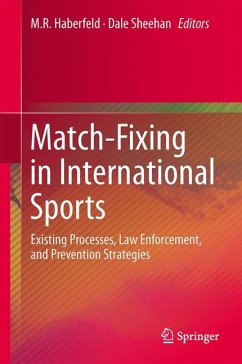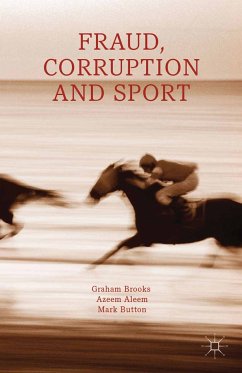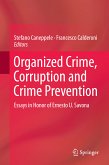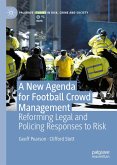Match-fixing includes everything from bribery of players, to putting undue influences on the owners of the soccer clubs, managers, coaches and others who have the ability to affect the final scores. In addition, match-fixing spills over into the arena of illegal betting (in person and online), which creates a host of additional organized crime opportunities, including human trafficking, prostitution, drugs, extortion and even terrorism.
This timely volume brings together international contributions with an aim is to increase awareness of the problems associated with match-fixing and the degree to which key agents in sport, particularly young people, are vulnerable.The contributions are based on INTERPOL's Global Experts Meeting in Singapore, in November 2012, which brought together key speakers to discuss issues surrounding match-fixing and how to combat corruption in football through channels of education. The purpose of this meeting was to identify ways that academia can play a role in developing and implementing training modules and academic courses, including certification procedures, to prevent match-fixing and develop lines of study at all educational levels. This unique work reflects the gravity of the situation around the world together with possible solutions. It will be of interest to researchers studying organized crime and criminal networks, as well as related areas of sports research and international law.
This timely volume brings together international contributions with an aim is to increase awareness of the problems associated with match-fixing and the degree to which key agents in sport, particularly young people, are vulnerable.The contributions are based on INTERPOL's Global Experts Meeting in Singapore, in November 2012, which brought together key speakers to discuss issues surrounding match-fixing and how to combat corruption in football through channels of education. The purpose of this meeting was to identify ways that academia can play a role in developing and implementing training modules and academic courses, including certification procedures, to prevent match-fixing and develop lines of study at all educational levels. This unique work reflects the gravity of the situation around the world together with possible solutions. It will be of interest to researchers studying organized crime and criminal networks, as well as related areas of sports research and international law.
Dieser Download kann aus rechtlichen Gründen nur mit Rechnungsadresse in A, B, BG, CY, CZ, D, DK, EW, E, FIN, F, GR, HR, H, IRL, I, LT, L, LR, M, NL, PL, P, R, S, SLO, SK ausgeliefert werden.
"The aim to create academic awareness and trigger discussion about the operationalisation of Sports Related Crimes (SRC), in order to facilitate an effective justice response globally. ... Match-Fixing in International Sports is a very informative collection on a rather under-researched topic that is receiving increasing attention. ... This book should be read by anyone interested in understanding match-fixing, the reasons behind it and its implications around the globe." (Argyro Elisavet Manoli, Trends in Organized Crime, Vol. 18, 2015)









